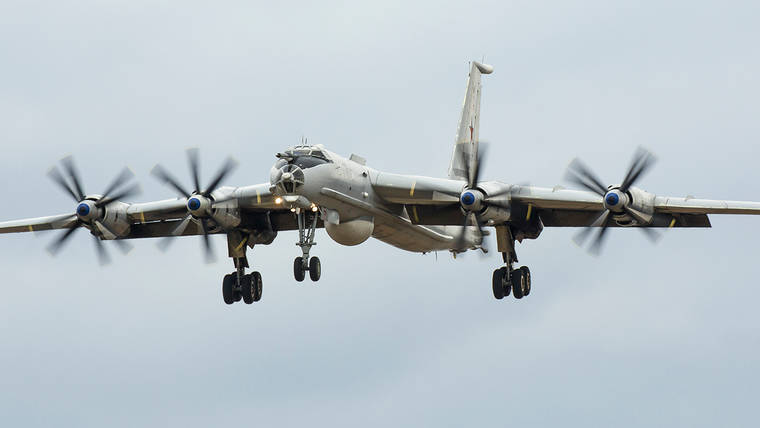Russia details exercise near Hawaii to destroy a carrier strike group


COURTESY ANDREI SHMATKO
A Russian Tu-142MZ “Bear” approaches Vladivostok International Airport in 2019. Tu-142M3 long-range, anti-submarine warfare aircraft headed in the direction of Hawaii, causing F-22 fighters to be scrambled.


The Russian Ministry of Defense said in a recap of its naval and air exercise off Hawaii that it practiced “destroying the aircraft carrier strike group of the mock enemy” and delivering a simulated strike with cruise missiles against “critically important” military infrastructure.
“To create the situation as close as possible to the real one, the grouping of the forces of the Pacific Fleet was divided into two tactical groups, one of which played the role of a conditional enemy and opposed the main forces of the grouping of the fleet in the far sea zone,” the Russians said Monday in a release translated to English.
Two detachments of ships, operating about 2,500 miles southeast of the Kuril Islands, “worked out the tasks of detecting, countering and delivering missile strikes against an aircraft carrier strike group of a mock enemy,” the ministry said.
Midway Atoll is about 2,100 miles from the Kuril Islands, while Kauai is about 3,200 miles.
Up to 20 surface warships, including a submarine and support vessels, were involved in the exercise “in the far sea zone, which is being held for the first time in the recent history of the Pacific Fleet in the central part of the Pacific Ocean,” the Russian defense ministry said.
“Aviation in the exercise is represented by 20 aircraft, including long-range anti-submarine aircraft Tu-142M3, anti-submarine aircraft Il-38, high-altitude fighter-interceptors MiG-31BM, deck anti-submarine and search and rescue helicopters Ka-27.”
Don't miss out on what's happening!
Stay in touch with breaking news, as it happens, conveniently in your email inbox. It's FREE!
Twitter user OSINT-1 (short for open source intelligence) posted a satellite view of the Russian flotilla 35 nautical miles (40 statute miles) south of Honolulu on Saturday escorted by three U.S. Navy destroyers and a Coast Guard cutter.
“The Russian vessels are transiting west and are out of the Hawaii Operation Area,” Navy Capt. Mike Kafka, a spokesman for U.S. Indo-Pacific Command at Camp H.M. Smith, said on Monday. “As part of our normal daily operations, we continue to track all vessels in the Indo-Pacific area of operations through maritime patrol aircraft, surface ship and joint capabilities.”
Kafka said the Russian vessels operated in international waters throughout the exercise.
“At the closest point, some ships operated approximately 20 to 30 nautical miles (23 to 34 statute miles) off the coast of Hawaii,” he said. “We closely tracked all vessels.”
The Russian vessels had been located more than 300 miles west of the main Hawaiian Islands for parts of the drills.
The deployment of Russian “Bear” bombers as part of the exercise twice resulted in missile-armed Hawaii Air National Guard F-22 fighters scrambling to possibly intercept the turboprop planes — which headed in the direction of Hawaii but never came close, officials said. No intercepts were made.
The missile strike practice was conducted by the “flagship of the Pacific Fleet” missile cruiser Varyag, the frigate Marshal Shaposhnikov, and multiple corvettes, the Russians said.
A submarine was involved and support to the naval strike groups was provided by two long-range Tu-142Mz anti-submarine aircraft which flew from Kamchatka Peninsula.
“The planes spent more than 14 hours in the air, having covered about 10,000 kilometers during this time. The Tu-142M3 in the near zone was escorted by the MiG-31BM high-altitude interceptor fighters of the Pacific Fleet,” the defense ministry said.
As part of the exercise, long-range aircraft carried out refueling from an Il-78 refueling aircraft of the Russian Aerospace Forces.
“During the exercise, the naval aviation of the Pacific Fleet also solved the problems of searching for and tracking submarines of the imaginary enemy. To this end, over the waters of the Sea of Okhotsk and the Pacific Ocean, six Il-38 and Il-38N anti-submarine aircraft” were involved in pairs, the release said.
How many Russian ships were actually near Hawaii was never clear. The satellite imagery reveals at least seven ships. Officials stressed that they operated in international waters and there was no threat to the homeland.
Retired Navy Capt. Carl Schuster, a former director of operations at U.S. Pacific Command’s Joint Intelligence Center and a Hawaii Pacific University adjunct professor, said the entire exercise near and far could have involved up to 20 warships.
“It depends on how you define ‘involved,’ ” Schuster said Friday. “The Russians basically say that any ship that gets under way and has a role in the exercise means it’s involved.”
The Russian Pacific Fleet has a very low priority compared to its western fleets in terms of operating budget, spare parts and readiness, he said.
“Politically, it (the exercise) is a big deal, but operationally, it’s more like a little deal,” Schuster said. “The fact that they can get 20 of their ships under way at all is semi-significant. It means that they are better off than they were a decade ago.”




